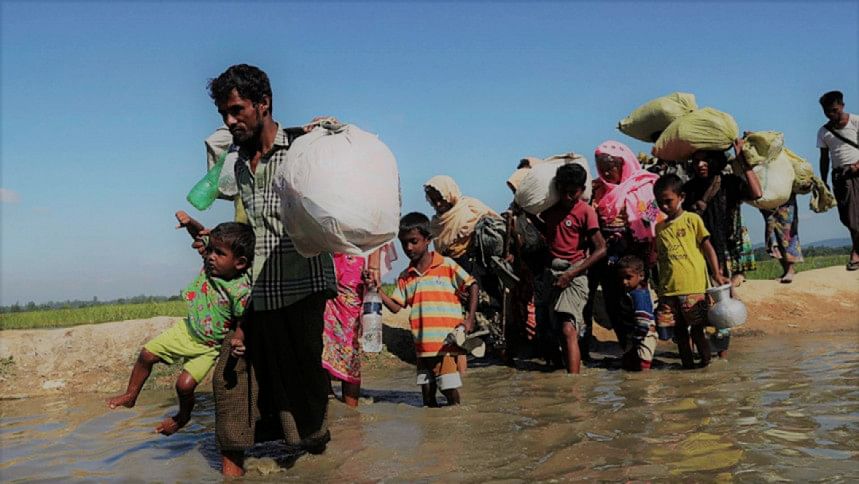Dwindling aid, stalled repatriation

Rising insecurity in the Rohingya camps in Cox's Bazar, along with declining aid and stalled repatriation have created a crisis that threatens to spiral out of control, said a new report of the International Crisis Group, a think tank based in Brussels.
"Security in and around the refugee camps in Cox's Bazar has worsened significantly in recent years. The main reason is that armed and criminal groups have firmed up a foothold inside the camps, something that Bangladeshi law enforcement has failed to stop," said the report today.
The report titled "Crisis Mounts for Rohingya Refugees in Bangladesh" says violence in Rohingya camps has escalated with up to a dozen different groups now engaged in turf wars and criminal activity.
According to official figures, armed groups were responsible for almost 50 killings in the camps in the first half of the year, more than the number recorded in all of 2022, the report said.
It says crime not directly related to the ARSA-RSO battles is also increasing. An analyst monitoring crime in the camps recorded over 700 abductions in the first nine months of 2023, up from around 200 in 2022 and 100 the year before.
Dwindling aid
In 2022, the UN's humanitarian appeal was only 63 percent funded, and pledges for 2023 have decreased even further, leading to a reduction in essential services by humanitarian organisations, according to the ICG.
"The cuts are devastating because most refugees are heavily dependent on aid; government restrictions designed to prevent Rohingya from integrating into Bangladesh mean that finding legal employment is exceedingly difficult," ICG said.
There are already indications that the aid cuts are having a range of deleterious effects, from rising malnutrition rates among children to more cases of intimate partner violence. More young men are joining armed groups and criminal gangs to get a monthly wage.
"Girls and women, meanwhile, are more frequently turning to sex work or are being married off at a young age, either inside the camps, to Bangladeshis outside them or to Rohingya men who have emigrated to Malaysia, which requires undertaking dangerous trips in boats run by smugglers."
In 2022, over 3,500 Rohingya took to the sea to find sanctuary abroad, according to UN figures – five times the number in the previous year.
Repatriation
In early 2023, Naypyitaw and Dhaka attempted Rohingya repatriation with a pilot project, but it's likely to fail as none of the listed refugees are willing to return due to the current conditions in Rakhine, as per the ICG. Two previous attempts in 2018 and 2019 had also failed.
"They have certain common demands, including that they receive citizenship on return and can return to their original villages…However, the Myanmar regime remains unwilling to budge on many of these demands."
The report said Dhaka and its partners should take a more realistic approach to prospects for refugee returns. It should plan for the long-term goal as the security situation in northern Rakhine would mean that any Rohingya who return will be once again at risk of displacement.
"If Rohingya return to Myanmar but are then internally displaced or even forced to seek refuge in Bangladesh once more, it would deal a massive blow to future repatriation efforts," the report said.
Dhaka also should be more concerned about ensuring that Rohingya armed groups do not use its territory to build their strength and launch attacks in Myanmar.
"Should any group stage a cross-border strike, it would likely reverse the slow but positive progress that the AA [Arakan Army] has made in improving relations between the Rakhine and Rohingya communities."
The ICG also suggested that donors commit to increasing support for the Rohingya in Bangladesh in the short term. The aid agencies should increase efficiency and redouble efforts to raise funds from non-traditional donors, particularly Gulf Arab states, which to date have gleaned little.

 For all latest news, follow The Daily Star's Google News channel.
For all latest news, follow The Daily Star's Google News channel. 



Comments